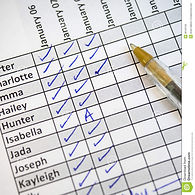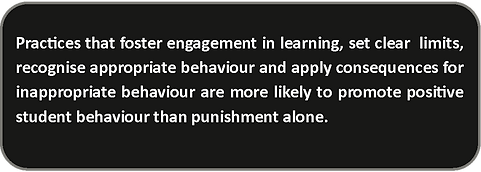Education Act 1990
All actions related to school and classroom management are governed by legislation (Education Act 1990) and policy (both Department of Education and Communities NSW [DEC] policy and school policy). It behooves teachers to become acquainted with the laws and guidelines under which they must function.
The following is an outline of the most pertinent points, however as graduate teachers you would be wise to read the source documents which are hyperlinked throughout this overview for your convenience.
Attendance
Part 5 outlines the
legislation relating to
attendance. The min-
imum age for leaving
school is defined as:
(a) the age at which the child completes Year 10 of secondary education or
(b) the age of 17 years,
whichever first occurs.
The Act also outlines the duty of care that parents and guardians have to ensure their child is enrolled at, and attends, a school. In the event that a child’s attendance is deemed unsatisfactory, the Act provides for a conference of relevant parties conducted by an authorised person appointed by the Children’s Court. The purpose of the conference is to provide the child with the necessary support to attend school regularly, and it may include such things as free exchange of information between relevant parties, addressing issues in dispute and providing services to facilitate school attendance.

School Discipline
Under Part 6 (35) of the Education Act 1990, the Minister has the right to control and regulate school discipline, and prepare guidelines to be adopted by schools. These guidelines are in the form of policy documents and I will outline them in the next section. The Act explicitly states that corporal punishment must not be permitted, and notes that other reasonable forms of punishment, including having the student carry out work or service for the school, are permitted.
The Education Act 1990 is a broad document, and from this the following policy documents have been produced by DEC NSW:
Note- Hyperlinks for all policy documents can be found under the References tab.
The current overarching policy document is the 2006 Student Discipline in Government Schools Policy. In this document, DEC commits to adopting a positive approach to school discipline, noting on page 4 of the supporting materials:

Caperberry High School Policies
Caperberry High School produces a School Prospectus which outlines the school's policy on student welfare, attendance and discipline.
The school uses an award system known as Sharp Awards. All teachers can give students Sharp Awards for excellence in behaviour or academia. Each week at the Tuesday assembly, two Sharp Award recipients are selected randomly in a draw to receive prizes. This system works particularly well with middle school students as a means of reinforcing positive behaviour and effort.
The high school uses a Level System for students who disrupt the learning of others or will not follow direct instructions.
Level 1 is for students who repeatedly disobey instructions or disrupt others, but not infractions of a serious nature or which may cause physical harm.
Level 2 is for more serious infractions or for students whose behaviour has not improved after being placed on a Level 1.
Level 1 and 2 are managed on a subject-by-subject basis and co-ordinated by Head Teachers.
When students receive several Level 2s in different subjects, they will be placed on a Level 3 and managed at a whole-school level.
All teachers are expected to use this system and to stay informed of which students are currently on Levels 1, 2 and 3 so that they can assist with addressing behavioural issues. The Millennium system tracks this information so that any teacher may look it up.
The pertinent pages of the Prospectus relating the the Level system are provided as a downloadable PDF file here.